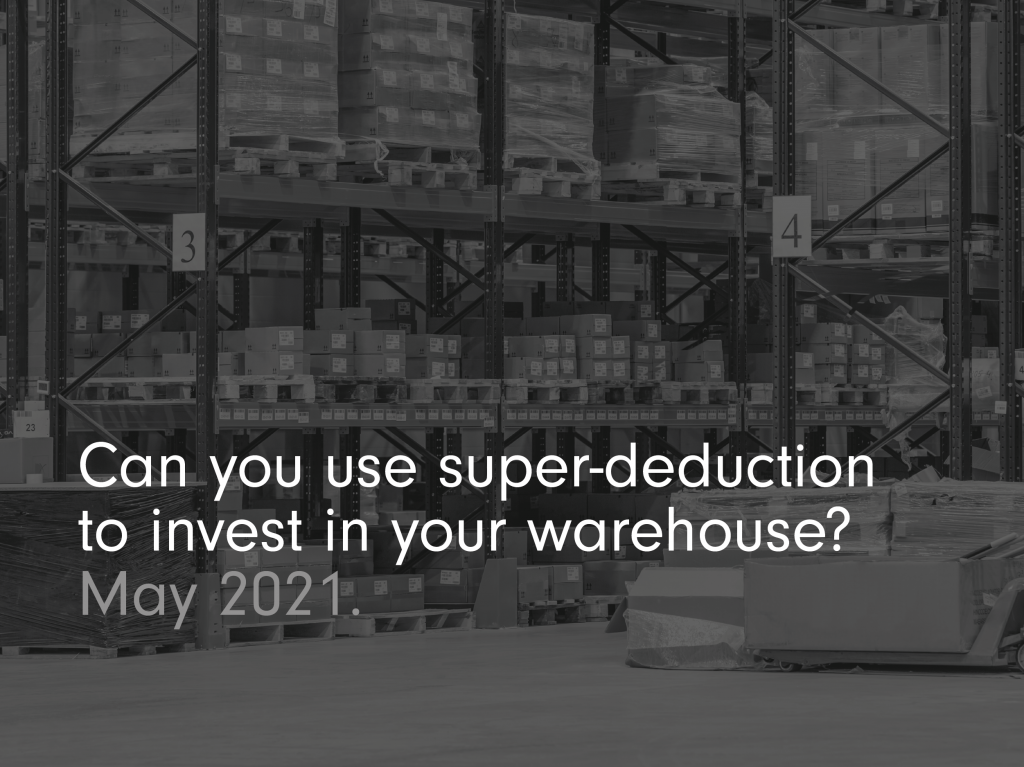Can you use super-deduction to invest in your warehouse?
The new super-deduction allowance is designed to encourage companies to invest in their businesses. Here’s what you need to know about this new tax allowance and how you might be able to use it to invest in technology or software solutions for your warehouse.

What is super-deduction?
The super-deduction allowance was announced by Chancellor Rishi Sunak as part of this year’s budget.
Using the new allowance, certain investments you make in your business qualify for a 130% capital allowance deduction. The tax break is, as Rishi Sunak said at the launch, “The biggest two-year business tax cut in modern British history.”
It has been launched to help companies invest in their own growth, with the aim of supporting recovery and driving the UK economy.
What are the main points about super-deduction?
Super-deduction is a tax break that allows businesses to deduct 130% of the cost of qualifying investments from their taxable profits. This means that for every £1 you invest under the scheme, you reduce your tax bill by 24.7p.
The super-deduction allowance affects contracts entered into from 3rd March 2021 and is applicable to qualifying expenditure made between 1st April 2021 and 31st March 2023. There is no upper limit on the amount of expenditure that a company can claim for.
The Office for Budget Responsibility estimates that the new policy will encourage £20 billion of investment a year. This will help the UK to counter the economic decline caused by the pandemic and lockdowns.
What can you use super-deduction for?
The official wording of the guidance is that super-deduction can be applied to qualifying purchases of plant and machinery assets. It further states that “most tangible assets” are considered plant and machinery for the purposes of claiming capital allowances and includes computer equipment and servers in a list of examples. So, purchasing any IT hardware, warehouse machinery and automation solutions look to be covered.
Where things are less clear is when it comes to software. There are differing opinions among providers about whether software would be classed as an asset, depending on whether the expenditure is classed as capital or revenue. Some have stated that purchased software – even if customised – does count, as the company owns the software and it is a capital asset. Others claim that SaaS solutions – that have a monthly fee and where the software runs in the cloud – are not owned by the purchaser, and the licence does not have a sufficiently enduring nature to be considered as a capital asset.
To help more, there is some general guidance about the tax treatment of software and website costs from the Association of Tax Technicians, which links to other useful information, including HMRC’s Capital versus Revenue Expenditure Toolkit. But for absolute clarity, and to avoid any doubt, we would recommend speaking to your tax agent or other financial experts before embarking on any particular projects.
What could you save?
If, for example, you invest £20k in equipment, you will be able to offset £26k against corporation tax. This will reduce your tax bill by just under £5k. In effect therefore, your investment would be more like £15k. Scale that up for a larger company and the figures work out that a £100k investment costs you just over £75k.
It’s certainly a generous tax break and will see companies looking closely at how much to invest in infrastructure and equipment that can bring about future growth.
Why invest in your warehouse?
As the UK comes out of lockdown, consumers are beginning to spend money again. There will likely still be some uncertainty about visiting shops in person at first, and with the massive surge in online shopping, buyers have become accustomed to having their goods delivered. This shift in shopping practices is likely to stick for many. In fact, a 2021 retail survey reported that just under a third (32%) of those asked said they expected their changed ecommerce behaviours to persist in the future.
With a greater acceptance of online shopping, distributors are expanding their warehouse capacities to cope. There has also been a shift in the makeup of orders for many suppliers too. Instead of supplying large orders to a few stores, they are supplying small orders to multiple customers. So this has increased the volumes of orders and comes with a corresponding reduction in the numbers of lines and items per order. Many wholesalers have exploited the surge in online sales by opening up directly to end-user sales, with the same effects.
To meet this growth in demand, the higher throughput and the increased order complexity, warehouses need to optimise their operations. Enhancing your warehouse solutions can help you to achieve this.
The new super-deduction allowance gives companies greater confidence to make investments and will counter the effects that low levels of business investment have had to date. Those that capitalise by spending on warehouse improvements are set to gain a real competitive advantage and a resultant boost to their sales.
For more information or a quote call us on 020 8819 9071 or get in touch.
Why not stay updated on LinkedIn?